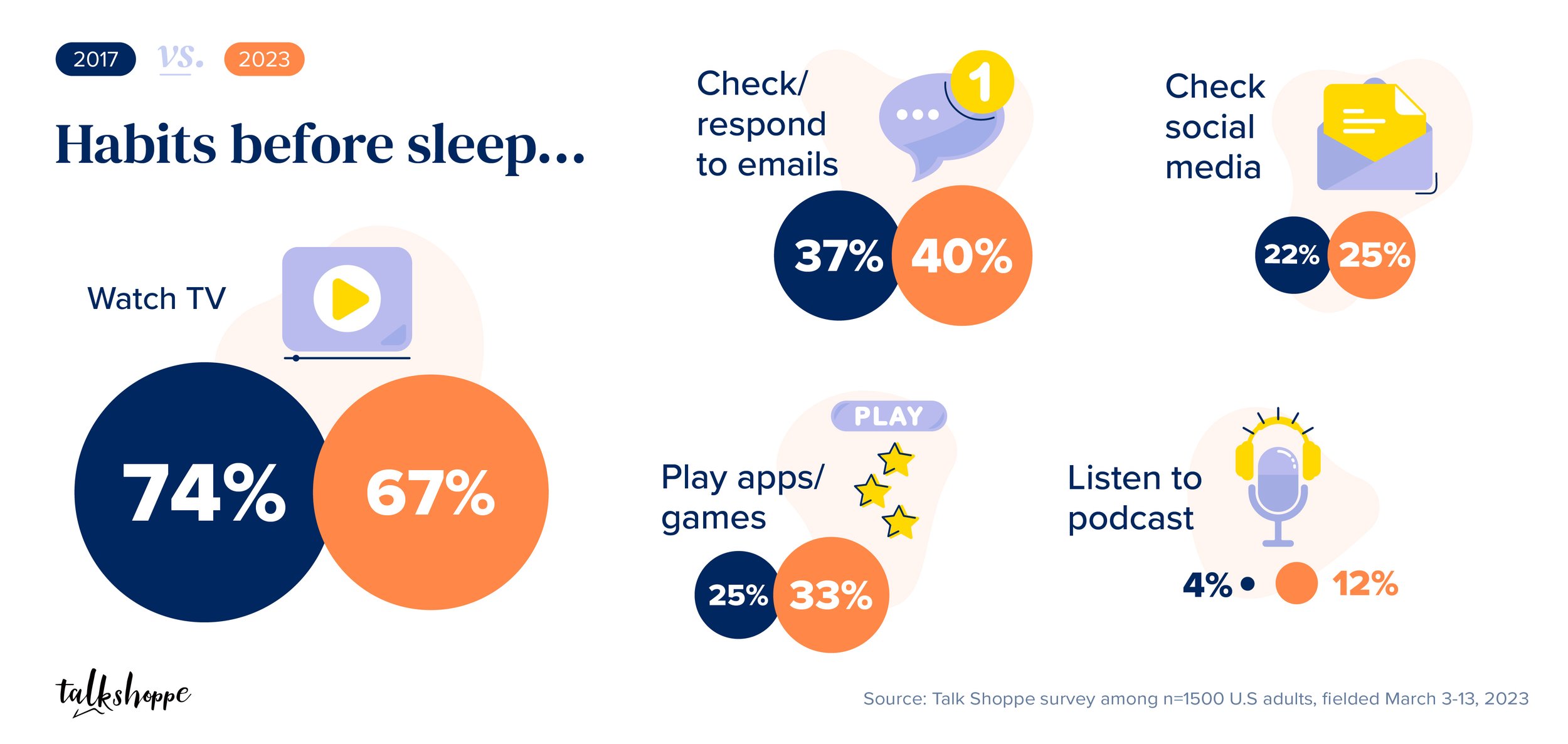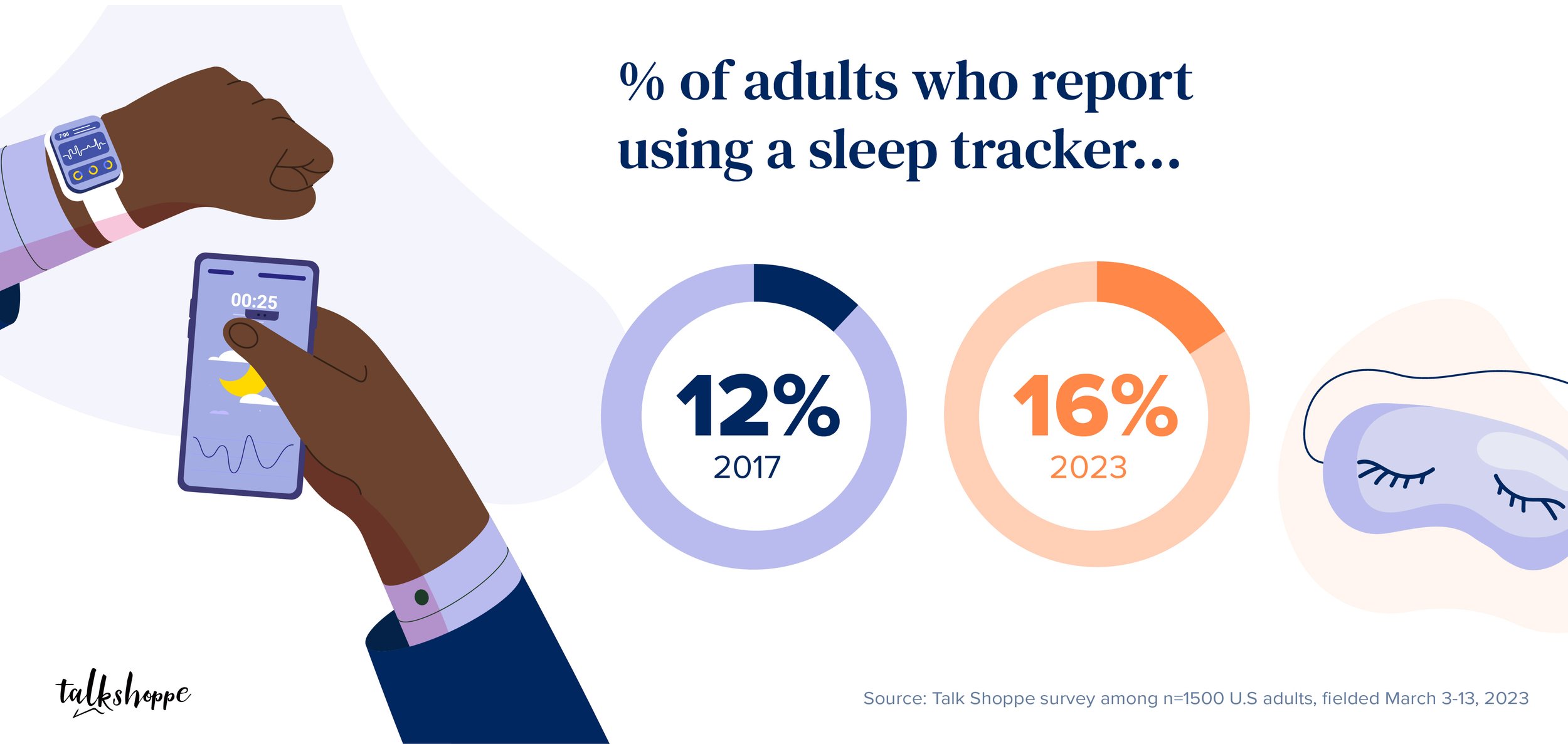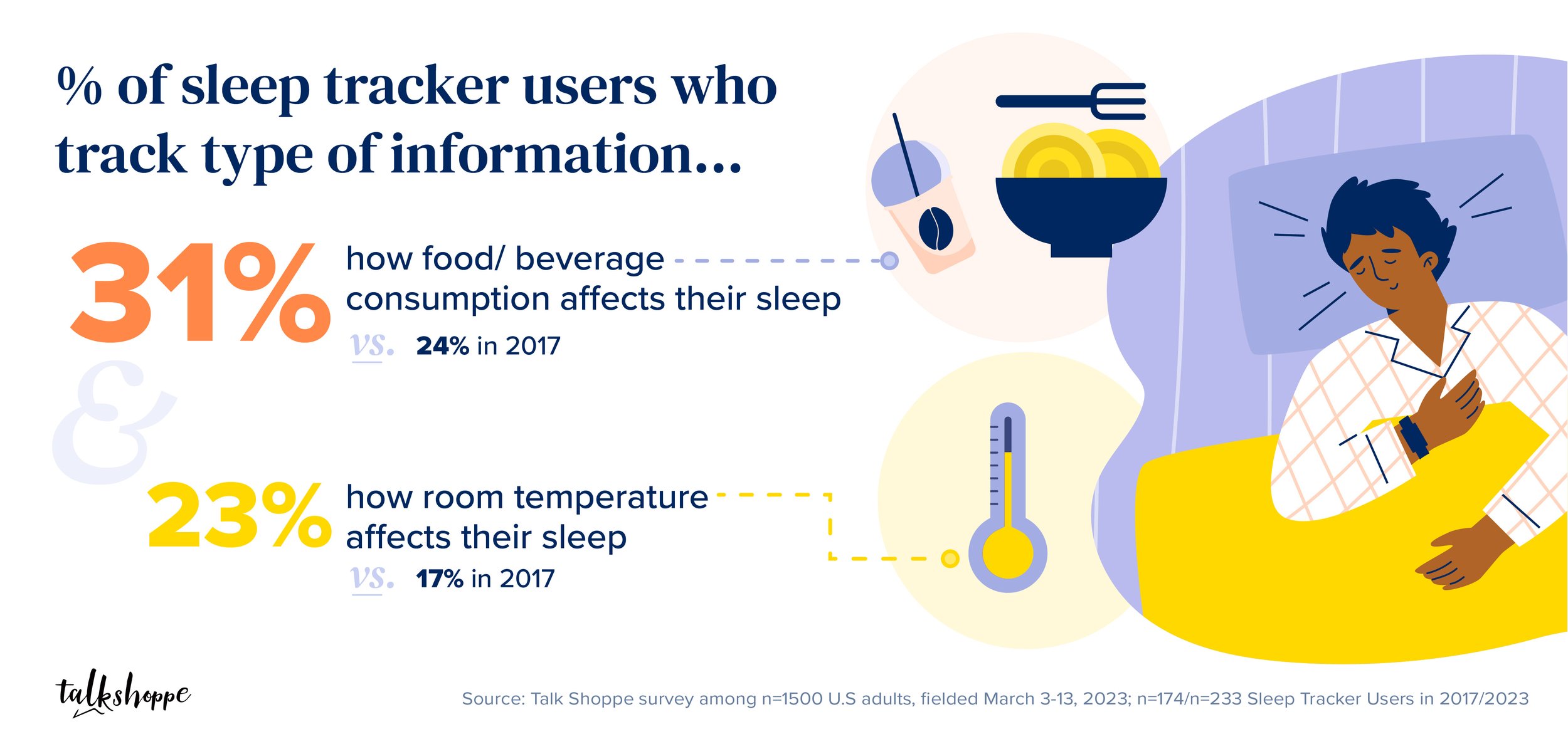Sleep & Technology
Read any article about how to improve your sleep and it will surely include some variation on this tip: avoid being on your phone or looking at screens right before bed, and don’t bring your phone into bed.
So, are people heeding this advice? Not really. And our data shows that it may actually be getting worse over time.
More people are bringing an electronic device to bed with them now than in 2017. According to our 2023 Sleep Census, 71% of U.S adults say they use an electronic device with a screen, such as a mobile phone, tablet, or laptop, at least sometimes while in bed, a statistically significant increase from the 65% of U.S adults who claimed to do the same thing in 2017.
Mobile technology plays a more prominent role today in how people unwind before bed. 72% of U.S adults rely on technology in some way to unwind before bed, compared to 59% in 2017. The most common activities include checking social media (+3 percentage points from 2017), playing on apps/games (+8 percentage points), and checking/responding to emails (+3 percentage points). As podcasts exploded in popularity over the past six years they also lulled more people to sleep: in 2023, 12% of people said they unwind to a podcast before bed, a relative minority but also a 3x increase from 2017.
Are all these activities replacing something else? Yes. As the use of mobile technology around bedtime increases, less people today report watching TV as a way to unwind before going to sleep (67% in 2023 vs. 74% in 2017, a statistically significant decline).
Mobile devices are not just used to unwind before bed, they’re a nightstand must-have. 56% of adults say they must have their phone or tablet on their nightstand, significantly higher than in 2017 (51%). To be fair, the phone probably doubles as an alarm clock as less people feel compelled to have one on their nightstand compared to six years ago (26% vs. 35%, a statistically significant difference).
So people are spending more time with their devices during bedtime. But is there any proof that using a phone in bed frequently has an impact on one’s sleep? Yes, and it's both on quantity and quality.
Frequent in-bed device users, or people who use electronic devices with a screen in bed often or all of the time, report sleeping less. 43% of Frequent in-bed device users say they typically get 7+ hours of sleep a night, which is a significantly lower percentage compared to the 51% of Infrequent or non-users who say the same thing. Frequent in-bed device users also get to bed later: 52% of them report going to bed after midnight compared to 27% of Infrequent or non-users, a statistically significant difference.
Frequent in-bed device users also say that the quality of their sleep is worse. Frequent in-bed device users are more likely to say that they often feel sleepy during the day than Infrequent or non-users (57% vs. 41%). About 1-in-3 (30%) describe their sleep as “not great” or “terrible”, a significantly higher proportion compared to Infrequent or non-users (24%).
Infrequent in-bed device users are also more likely to say they suffer from insomnia (30% vs. 22%) and that their sleep has gotten worse over the past 12 months (32% vs. 25%).
When asked to explain in their own words why their sleep has gotten worse over the past 12 months, Frequent in-bed device users are self-aware of the impact of their devices:
“I spend too much time on my phone and then have trouble going to sleep” - 53 year old from San Antonio, TX
“Stress from school and not being able to put the phone down” - 18 year old from Knoxville, TN
“I have been using electronics a lot more, which has made my sleep schedule messed up” - 22 year old from Little Rock, AR
Use of electronics in bed can create a vicious circle that locks people into bad sleep. End the day with a device, start the day with a device: people who frequently use a device before bed are also more likely to reach for it in the morning - 42% of them say the first thing they do in the morning is check their phone and reply to messages/emails compared to 26% among infrequent/non-users.
Frequent in-bed device users either rationalize their worse sleep after the fact or their behavior breeds unhealthy attitudes towards sleep: they are more likely to agree with the notion that they get ahead in life because they sleep less than others (20% vs. 12%) and take pride in the fact that they do not need as much sleep as others (24% vs. 16%).
Not all devices, however, are created equal. Sleep trackers, which are intended to improve people’s sleep, are also more commonplace today and their use appears to have a positive impact.
More people report using a sleep tracker today than in 2017. In 2023, nearly 1-in-5 adults (16%) reported using a sleep tracker, a significantly higher proportion than in 2017 (12%).
Not only are more people using a sleep tracker, but the type of information they are looking to track has also diversified. In 2017, the majority of sleep tracker users were interested in just tracking the time that their sleep was restful versus the time it was restless. Since then, sleep tracker users have become more interested in understanding how different variables impact their sleep. When asked in 2023, about a third (31%) of sleep tracker users say they’re interested in tracking how the room temperature affects their sleep (+6 percentage points from 2017), and about 1-in-4 (23%) said they are interested in tracking how food/beverage consumption affects their sleep (also +6 percentage points from 2017).
FitBit continues to be the most popular sleep tracker, even if it has lost ground from 2017. Just over 4-in-10 (43%) sleep tracker users say they use a FitBit product to track their sleep. While still ranking first, FitBit lost much ground since Talk Shoppe’s first Sleep Census in 2017, when 68% of sleep tracker users said they used it. Apple Watch is currently the second most popular tracker, with 27% of sleep tracker users saying they use it.
People who use a sleep tracker report better sleep. In 2023, about a third (30%) of sleep tracker users say their sleep has gotten better over the last 12 months, compared to 18% among the general population. Sleep tracker users in 2023 are also more likely to report an improvement in their sleep than sleep tracker users did back in our 2017 survey, which suggests that the quality of sleep trackers has improved over time and/or that long-term usage leads to better results over time.
At this point you may be thinking, “Maybe sleep tracker users report better sleep because they have generally healthier lifestyles and routines, not because of the actual sleep tracker”. While we certainly don’t know everything about sleep tracker users, our data shows that they do not differ significantly from the general population on other lifestyle choices: 38% say they maintain a healthy and balanced diet (vs. 36% among the general population), 44% say they exercise on a regular basis (vs. 32%), and 32% say they consume caffeine after noon (vs. 33%). There is therefore evidence to at least hypothesize that it is the use of the tracker that is behind the improvement in their sleep.










